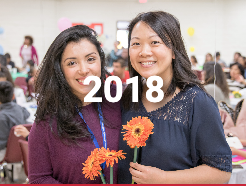2018
Health Equity Initiative Solidarity Event – response to family separation at the border
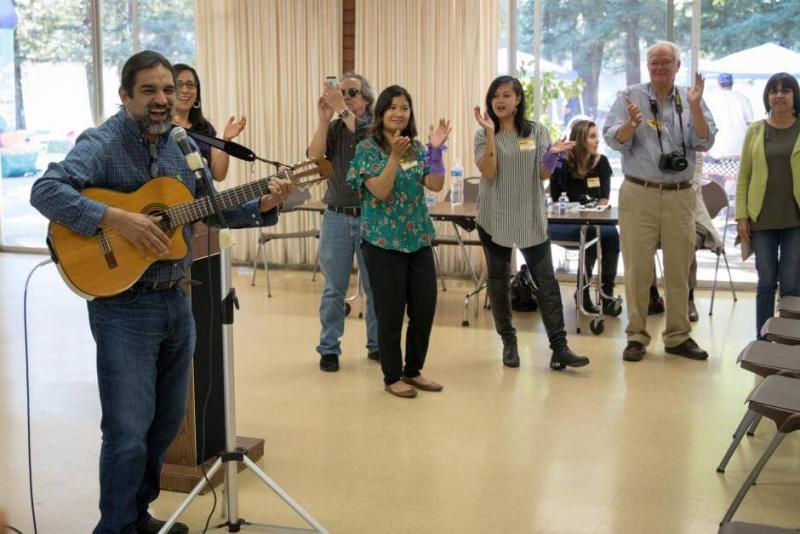 On August 5th, 2018, in response to the family separations at the southern border of the United States, the Behavioral Health & Recovery Services’ (BHRS) Office of Diversity and Equity (ODE), and Health Equity Initiatives (HEI‘s) hosted “One Community,” an event in Redwood City to celebrate solidarity and unity in San Mateo County.
On August 5th, 2018, in response to the family separations at the southern border of the United States, the Behavioral Health & Recovery Services’ (BHRS) Office of Diversity and Equity (ODE), and Health Equity Initiatives (HEI‘s) hosted “One Community,” an event in Redwood City to celebrate solidarity and unity in San Mateo County.
The event featured various speakers and artists who shed light on discriminatory policies that have affected communities throughout history. The day was a reminder that issues like family separation are not specific to just one group but have affected many. The event included keynote speaker Macrina Mota-Pineda from the documentary “Torn Apart,” speaker Steve Okamo who survived the testimonies from San Mateo County residents, and youth poets. Attendees also had the opportunity to hear from San Mateo County District 5 Board of Supervisors member David Canepa on San Mateo County’s ongoing commitment to remain a welcoming county for all. The event concluded with a “unity clap,” led by the Filipino Mental Health Initiative, and the song “De Colores,” interpreted by musician Francisco Herrera, leaving all present with renewed hope and a sense of community.
First Year to Recognize Asian American Native Hawaiian Pacific Islander(AANHPI) Mental Health Day
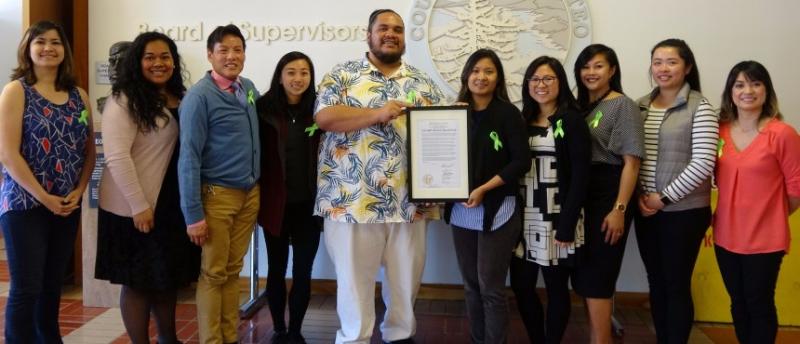 For the first time in San Mateo County history, the Board of Supervisors proclaimed May 10th as Asian American Native Hawaiian Pacific Islander (AANHPI) Mental Health Day. San Mateo County joined the State of California, City and County of San Francisco, and City of Austin in proclaiming this significant day. The purpose of AANHPI Mental Health Day is to raise awareness about the challenges and resilience of the AANHPI community, especially around issues of mental health and substance use. AANHPI individuals make up 30.5% of the San Mateo County population. Despite being a substantial portion of the County, AANHPI communities have the lowest utilization rates of behavioral health services compared to other ethnic groups. These low utilization rates are attributed to various barriers, including cultural stigma, limited behavioral health literacy, and lack of multilingual service providers who can speak with clients in their preferred languages. Historically, the San Mateo County AANHPI community has lived in silos with few events that recognize the collective AANHPI community in San Mateo County. AANHPI Mental Health Day is meant to break down the silos and build bridges for our AANHPI community to work together towards wellness. We thank our Chinese Health Initiative, Filipino Mental Health Initiative and Pacific Islander Initiative for their role and support of this important proclamation.
For the first time in San Mateo County history, the Board of Supervisors proclaimed May 10th as Asian American Native Hawaiian Pacific Islander (AANHPI) Mental Health Day. San Mateo County joined the State of California, City and County of San Francisco, and City of Austin in proclaiming this significant day. The purpose of AANHPI Mental Health Day is to raise awareness about the challenges and resilience of the AANHPI community, especially around issues of mental health and substance use. AANHPI individuals make up 30.5% of the San Mateo County population. Despite being a substantial portion of the County, AANHPI communities have the lowest utilization rates of behavioral health services compared to other ethnic groups. These low utilization rates are attributed to various barriers, including cultural stigma, limited behavioral health literacy, and lack of multilingual service providers who can speak with clients in their preferred languages. Historically, the San Mateo County AANHPI community has lived in silos with few events that recognize the collective AANHPI community in San Mateo County. AANHPI Mental Health Day is meant to break down the silos and build bridges for our AANHPI community to work together towards wellness. We thank our Chinese Health Initiative, Filipino Mental Health Initiative and Pacific Islander Initiative for their role and support of this important proclamation.
See https://www.smchealth.org/health-equity-initiatives for more information.
Policy 18-01: Cultural Humility, Equity, and Inclusion Framework
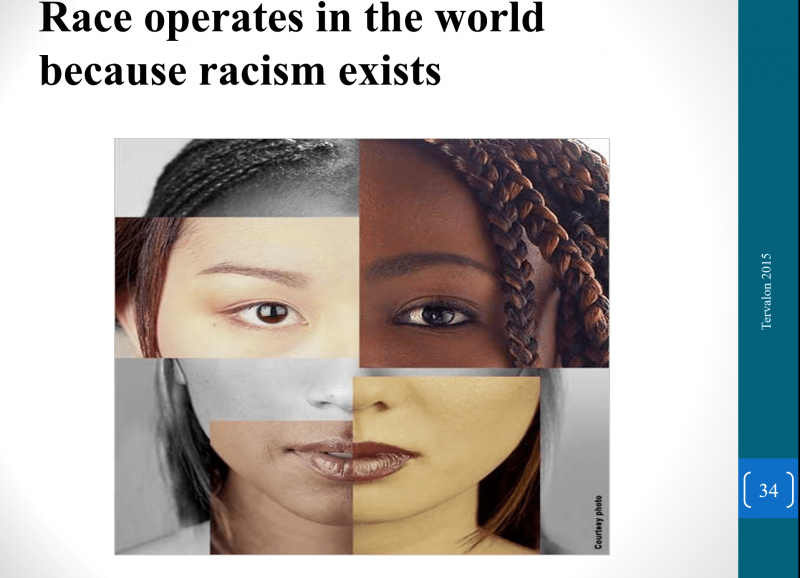 On February 23rd, 2018, Policy 18-01, Cultural Humility, Equity, and Inclusion Framework; Implementation of Cultural and Linguistically Appropriate Services (CLAS) Standards, was passed. The policy is intended to inform Behavioral Health & Recovery Services (BHRS) about existing and ongoing organizational efforts to embrace diversity, improve quality, and eliminate health inequities that align with the National Standards for CLAS Standards. The policy dictates that BHRS is committed to providing effective, equitable, and welcoming behavioral health and compassionate recovery services that are responsive to individuals’ cultural health beliefs and practices. The policy also states that BHRS will continue to develop a comprehensive understanding of best practices in governance, leadership, workforce development, communication and language assistance, and a continuous practice of engagement, improvement, and accountability within all levels of the organization.
On February 23rd, 2018, Policy 18-01, Cultural Humility, Equity, and Inclusion Framework; Implementation of Cultural and Linguistically Appropriate Services (CLAS) Standards, was passed. The policy is intended to inform Behavioral Health & Recovery Services (BHRS) about existing and ongoing organizational efforts to embrace diversity, improve quality, and eliminate health inequities that align with the National Standards for CLAS Standards. The policy dictates that BHRS is committed to providing effective, equitable, and welcoming behavioral health and compassionate recovery services that are responsive to individuals’ cultural health beliefs and practices. The policy also states that BHRS will continue to develop a comprehensive understanding of best practices in governance, leadership, workforce development, communication and language assistance, and a continuous practice of engagement, improvement, and accountability within all levels of the organization.
Behavioral Health & Recovery Services Cultural Competence Updated; integrated Theory of Change goals
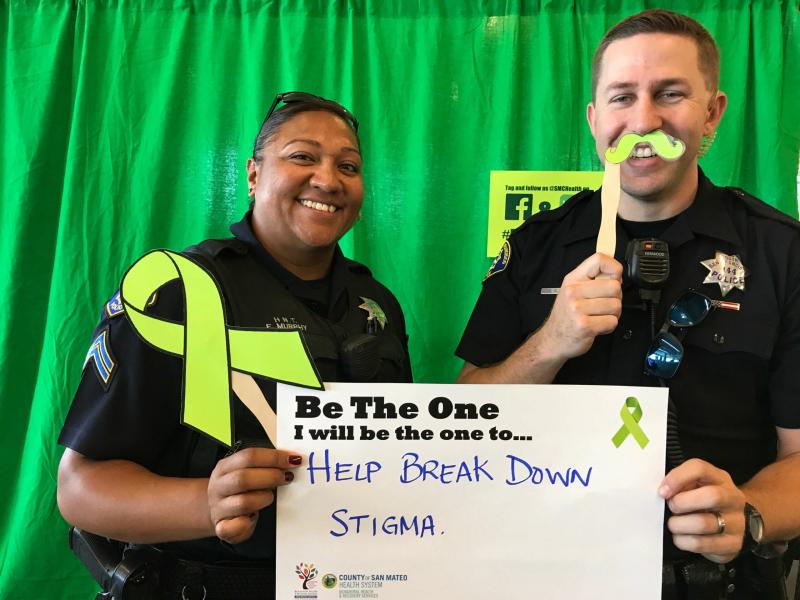 Behavioral Health & Recovery Services (BHRS) deepens its efforts to develop a culturally responsive and inclusive system in support of the behavioral health and recovery needs of San Mateo County’s increasingly diverse population. This work occurred via updating the BHRS Cultural Competence Plan, integrating our Theory of Change (TOC) goals. Through the BHRS Office of Diversity and Equity (ODE), BHRS deepens the meanings and manifestations of cultural humility and inclusion in partnership with diverse stakeholders and communities. ODE staff have been leading this work through 1) the community‐oriented Health Equity Initiatives and the Diversity and Equity Council (Cultural Competence Committee), 2) facilitating BHRS’ process to Multicultural Organization Development, 3) championing the adoption of the broader County Health racial equity framework, and 4) the development of a health equity-focused Theory of Change framework for ODE.
Behavioral Health & Recovery Services (BHRS) deepens its efforts to develop a culturally responsive and inclusive system in support of the behavioral health and recovery needs of San Mateo County’s increasingly diverse population. This work occurred via updating the BHRS Cultural Competence Plan, integrating our Theory of Change (TOC) goals. Through the BHRS Office of Diversity and Equity (ODE), BHRS deepens the meanings and manifestations of cultural humility and inclusion in partnership with diverse stakeholders and communities. ODE staff have been leading this work through 1) the community‐oriented Health Equity Initiatives and the Diversity and Equity Council (Cultural Competence Committee), 2) facilitating BHRS’ process to Multicultural Organization Development, 3) championing the adoption of the broader County Health racial equity framework, and 4) the development of a health equity-focused Theory of Change framework for ODE.
Community-Informed Culturally Responsive Improvement Process
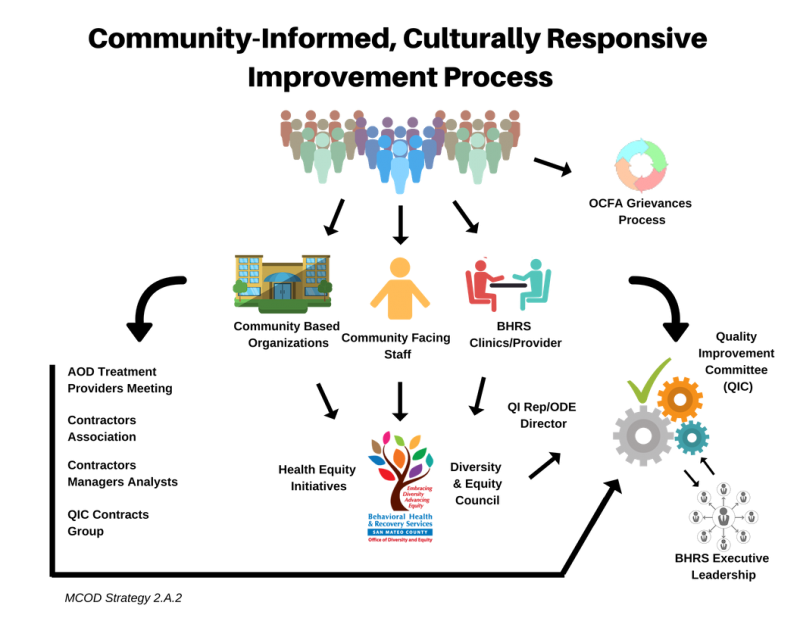 In 2018, the Community-Informed Culturally Responsive Improvement Process was developed to embed the Health Equity Initiatives (HEI’s) and the Diversity and Equity Council (DEC) in a feedback loop with the Behavioral Health & Recovery Services’ (BHRS) Quality Improvement Committee (QIC). This exchange of information between the DEC, QIC, HEI’s and Office of Diversity and Equity (ODE) is intended to take cultural responsiveness from a compliance activity towards institutional transformation process, with the following implications:
In 2018, the Community-Informed Culturally Responsive Improvement Process was developed to embed the Health Equity Initiatives (HEI’s) and the Diversity and Equity Council (DEC) in a feedback loop with the Behavioral Health & Recovery Services’ (BHRS) Quality Improvement Committee (QIC). This exchange of information between the DEC, QIC, HEI’s and Office of Diversity and Equity (ODE) is intended to take cultural responsiveness from a compliance activity towards institutional transformation process, with the following implications:
Community-facing staff and providers are acknowledged as advocates within our county system. Diverse staff are often hired to provide bilingual skills and bicultural expertise, yet there has been no formal process to bring up issues and propose changes to practices based on what staff hear or learn from the communities they represent.
ODE, HEI’s and the DEC provide the space for dialogue and problem-solving around issues and topics related to current socio-political events impacting the mental health of marginalized communities (e.g., immigration and deportation, hate crimes, etc.).
ODE, HEI’s and the DEC follow through on recommendations to QIC and BHRS Leadership for changes or creation of policy and other quality improvement activities.
Other key events in 2018:
The BHRS Office of Diversity and Equity publishes its Workforce Education and Training (WET) 10-Year Impact and Sustainability Report, and launches the Cultural Humility Training of Trainers. Our Adult Mental Health First Aid program holds its 100th course.
